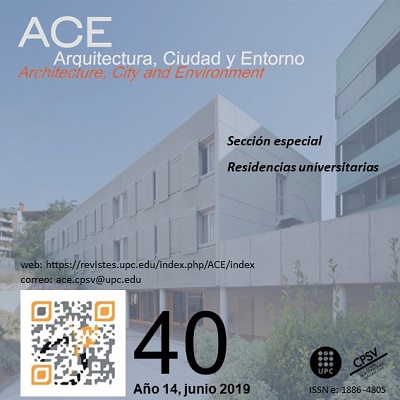L'allotjament universitari. Estat de la qüestió
DOI:
https://doi.org/10.5821/ace.14.40.6767Paraules clau:
allotjament universitari, residència universitàriaResum
Objectiu
L'objectiu d'aquest article és avaluar quina és la situació de l'allotjament en el Sistema Universitari Espanyol (SUE) en comparació amb el conjunt de països europeus i considerar quins podrien ser els objectius i estratègies a seguir per aquelles universitats espanyoles que han apostat per l'excel·lència i la internacionalització.
Metodologia
Metodològicament, l'estudi es realitza en base a l'anàlisi d'una enquesta promoguda per la Secretaria d'Universitats realitzada en el bienni 2010-2011, i un estudi comparat de les polítiques d'allotjament desenvolupades per les quinze millors universitats europees d'aquest període.
Conclusions
La primera conclusió és l'existència d'un dèficit molt greu que per la seva dimensió sembla inabordable. Inabordable per mantenir-se una concepció del segle dinou, del paper dels col·legis majors, poc d'acord amb la funció que haurien de complir en l'actualitat; per l'expansió territorial de la universitat espanyola, que ha posat una universitat a cada ciutat, o, simplement, per l'existència d'un mercat informal d'habitatges "pastera" que són més barates que l'oferta d'allotjament universitari "oficial". Actualment a Europa, l'oferta oficial cobreix les necessitats del 10% dels estudiants matriculats, mentre que a Espanya només atén al 4%. El primer repte universitari espanyol és equiparar-se a la mitjana europea.
La segona conclusió és la substitució de les ajudes en efectiu per la en espècies, tal com es fa en la majoria dels països europeus, subvencionant directament a les residències universitàries de manera que no només s'asseguri el compliment dels objectius de la beca , sinó també, s'incentivi la participació del sector privat en la promoció i manteniment d'aquests serveis.
La tercera és fomentar la participació de tots els membres de la comunitat universitària en la gestió de l'allotjament, tal com fan els sindicats universitaris alemanys o certes associacions britàniques que busquen garantir la qualitat del servei a través de convenis, associacions i sindicatures que impliquin a tota la societat.
Originalitat
L'originalitat d'aquest estudi rau en la manera com s'afronta el problema de l'allotjament universitari, des d'una posició crítica tant en relació amb l'enyorança del college, com amb una demanda il·limitada de places d'allotjament absolutament fora de lloc, i dels objectius a assolir: una oferta d'allotjament equivalent al 10% dels estudiants matriculats i una implicació social que comprometi tota la comunitat.
Descàrregues
Publicades
Número
Secció
Llicència
| CRITERIS DE PROTECCIÓ INTEL·LECTUAL |
En aquest moment es compta amb la protecció de la Oficina Espanyola de Patents i Marques, mentre que la protecció global s'està tramitant davant la Organització Mundial de la Propietat Intel·lectual (OMPI/WIPO). Així mateix, la Oficina del Número de Sèrie Estàndar Internacional (ISSN) ha otorgat els següents números: 1886-4805 (versió electrònica) i 1887-7052 (versió en paper). |
| COPYRIGHT |
El contingut dels articles i els comentaris en ells expresats són responsabilitat exclusiva dels seus actors, i no reflexen necessariament la opinió del Comité Editor de la revista. Els treballs publicats per ACE queden sotmesos a la llicència CC BY-NC-ND 3.0 ES http://creativecommons.org/licenses/by-nc-nd/3.0/es/ La qual cosa vol dir que les persones autores només tenen i retenen els drets d'autor dintre de les limitacions imposades per la anterior llicència |





































